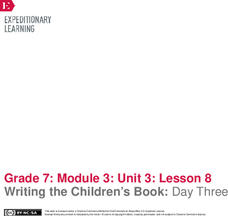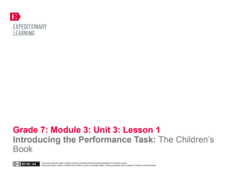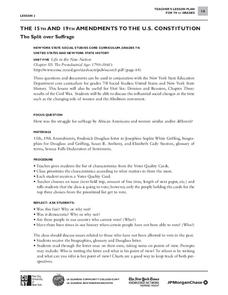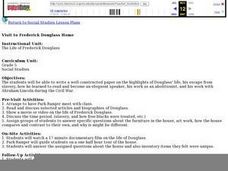EngageNY
Writing the Children’s Book: Day Three
Illustrations are a key feature of children's books. Using the resource, pupils learn about adding illustrations to their children's books. Next, as they complete their storyboards and work on their second drafts, they consider their...
EngageNY
Coda: What Gives This Story Power? Re-Examining Powerful Stories
Writers consider what makes a story powerful as they listen to a short story about Frederick Douglass. Once finished, small groups complete a worksheet to analyze what makes the story so enduring.
EngageNY
Discussing and Identifying Themes: What Makes a Good Children’s Book?
Working in small groups, scholars look closely at a children's book to evaluate narrative techniques. Next, they complete a Children's Book Scavenger Hunt worksheet to analyze the literary elements of their selected stories.
EngageNY
Introducing the Performance Task: The Children’s Book
Using a Venn diagram, class members generate similarities and differences between narratives and summaries. Next, pupils co-create an anchor chart to capture their thinking about how an author zooms in on a particular part of a story.
National Woman's History Museum
Seneca Falls and Suffrage: Teaching Women's History with Comics
As part of the study of women's history, young scholars examine Chester Comix's strips about the Seneca Falls Convention and four 19th century leaders in the struggle for equal rights. After researching other elements of the Suffrage...
MCHS Early US History
Ken Burn’s Civil War, Episode 1: The Cause
Ken Burn's epic documentary miniseries The Civil War, broadcast in 1990, was the most-watched PBS program ever. A question sheet helps viewers keep track of events in the first episode of the documentary.
PBS
Frederick Douglass: Orator, Editor, and Abolitionist
Imagine the task of designing a national memorial for a former slave, orator, editor, and abolitionist! Scholars research and analyze the impact of the life of Frederick Douglass. Incorporating primary and secondary sources as well as...
Prestwick House
Narrative of the Life of Frederick Douglass
Take a moment in your language or social studies class to review key terms and details from Narrative of the Life of Frederick Douglass. A quick crossword puzzle allows learners to check understanding before a larger unit, test, or...
Learning to Give
Heroes with Heart
This resource provides a lesson that will have learners explain how women and minority figures worked for the common good of their community.
City University of New York
The 15th and 19th Amendments to the U.S. Constitution
Who gets to vote? Learn more about struggles for suffrage throughout United States history with a lesson based on primary source documents. Middle schoolers debate the importance of women's suffrage and African American suffrage before...
City University of New York
The Split Over Suffrage
Compare and contrast Frederick Douglass's and the National Women's Suffrage Association's stances on equal rights and suffrage with a series of documents and worksheets. Learners work together or independently to complete the packet, and...
Scholastic
Harriet Tubman: Moses of Her People
Who was Harriet Tubman, and what was her place on the Underground Railroad? Recall the bravery and achievements of this extraordinary figure with a short, engaging informational text and crossword puzzle.
Gilder Lehrman Institute of American History
Slave Narratives: Frederick Douglass, Harriet Jacobs, and the Columbian Orator
Young historians practice in-depth, quality analysis of primary source texts in this three-lesson unit, which examines excerpts from the slave narratives of Frederick Douglass, Harriet Jacobs, and Caleb Bingham.
Humanities Texas
Primary Source Worksheet: Frederick Douglass, “Expression of Gratitude for Freedom”
Here is a fantastic primary source analysis activity regarding Frederick Douglass' speech delivered at the unveiling of the Freedmen's Monument in 1876. The follow-up discussion questions and activities highlight Douglass' discussion of...
Curated OER
Antebellum Revivalism and Reform
A gold mine for American history teachers, this presentation cascades through the middle of the 19th century with the central themes of moral and social reform. Between the blossoming Mormon church, the tightening of the Temperance...
Curated OER
US Civil Rights Movement: Beginnings through the 60s
A real find for a U.S. History teacher, this presentation could supplement many class sessions about the Civil Rights Movement. Pictures of events, major figures, and "Whites Only" signs are striking and effective for even your most...
K12 Reader
Guess Who? Heroes of Civil Rights
Can your pupils identify these five important civil rights figures? Given five short descriptions, learners must match each person to his or her civil rights achievements.
Curated OER
Frederick Douglass Expository Reading Guide
Help your high schoolers navigate the cross-curricular text Narrative of the Life of Frederick Douglass with this reading guide. The questions guide learners through composing a summary of any given chapter in the text. In addition,...
Curated OER
Visit to Frederick Douglass Home
Fifth graders visit the home of Frederick Douglas to explore his escape from slavery and work as an abolitionist. After the visit, 5th graders complete a biographic essay of Douglas based on information gathered during the tour.
Curated OER
Perspective on the Slave Narrative
High schoolers examine narratives of two slaves: iam W. Brown and Frederick Douglas. They produce an essay explaining how Brown's narrative challenged the prejudices of readers in his own time and how it challenges prejudices today.
Curated OER
The American Civil War: A Nation Divided (1861-1865)
Intended for use with atlases, this presentation details the causes and effects of the Civil War. It includes historical pictures of battles and discussion points about the technology which emerged during (and for) the war. The final...
Curated OER
Narrative of the Life of Frederick Douglass: An American Slave by Frederick Douglass
In this online interactive reading comprehension instructional activity, students respond to 13 multiple choice questions about Narrative of the Life of Frederick Douglass: An American Slave. Students may submit their answers to be scored.
Curated OER
Narrative of the Life of Frederick Douglass: An American Slave by Frederick Douglass
In this literature worksheet, students respond to 12 short answer and essay questions about Narrative of the Life of Frederick Douglass: An American Slave. Students may also link to an online interactive quiz on the novel at the bottom...
Spark Notes
Narrative of the Life of Frederick Douglass by Frederick Douglass: Study Guide - Mini Essays
In this online interactive literature worksheet, students respond to 8 short answer and essay questions about Frederick Douglass's Narrative of the Life of Frederick Douglas. Students may check some of their answers online.

























